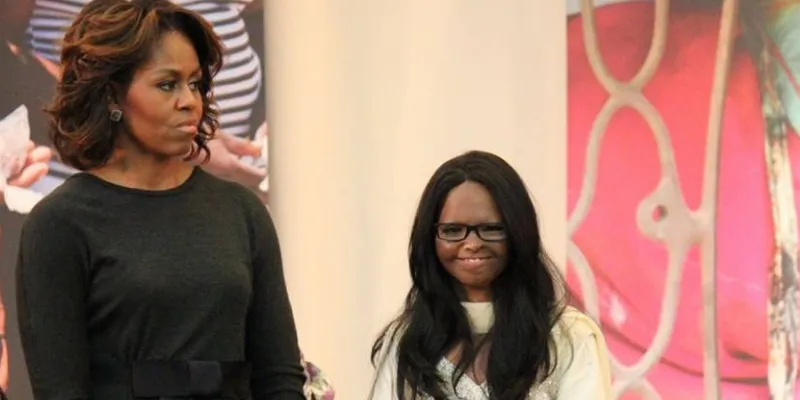These Indian girls are playing their part in making the world a better place
On National Girl Child Day, we celebrate these girls who are trying to make the world a better place and prove that they can achieve anything
In 2008, the Ministry of Women and Child Development announced that January 24 would be marked as National Girl Child Day across the country. While girls have proven their mettle in every sphere, many are denied opportunities; most are still killed in the womb or at birth.
Despite consistently outperforming boys in school examinations, many are denied higher education and are forced into marriages. Those that do enter the workforce often face discrimination because of a skewed perception of what a woman’s priorities should be.
Despite the many odds that are stacked against them, women continue to excel and stride ahead in their chosen fields, while inspiring and making a difference to those around them. On National Girl Child Day, we salute them and the difference they are making in the world.

Licipriya Kangujam (Image: Wishesh)
Licypriya Kangujam
The nine-year-old climate activist from Manipur has actively campaigned for climate change laws, and to make awareness about its impact compulsory in schools. She has been felicitated by the United Nations for her efforts level and has addressed global conferences on climate change and disaster management. She is the recipient of the Dr. APJ Abdul Kalam Children’s Award, the World Children’s Peace Prize, the India Peace Prize, and the SDGs Ambassador Award 2019.
In 2018, Licypriya donated her entire savings of Rs 100,000 to Kerala Chief Minister Pinarayi Vijayan to help children affected by the floods that ravaged the state. She has also spoken alongside many Heads of State about the importance of clean energy.
Licypriya has also founded Child Movement, a body that aims to raise awareness "to protect the planet by tackling climate change and natural disasters".

Archana Soreng (Image: Facebook)
Archana Soreng
Mumbai-resident Archana Soreng is a Research Officer at TISS Forest Rights and Governance Project in Vasundhara, Odisha. She is part of UN Secretary-General Antonio Guterres’ new advisory group that includes young leaders from across the world. This team will provide perspectives and solutions to tackle the pressing issue of climate change.
Her initiation into social work and development activism happened early. Her paternal grandfather was involved in forming small groups in his village Baliposh, to share knowledge about indigenous practices in farming and forest resource management.
Archana is experienced in advocacy and research, and she is working to document, preserve, and promote traditional knowledge and cultural practices of indigenous communities.
Archana has studied regulatory governance from the Tata Institute of Social Sciences (TISS) Mumbai, and also held the position of TISS Students Union President.

Tiffany Brar (Image: Jyotirgamaya Foundation)
Tiffany Brar
Tiffany Brar became blind shortly after birth due to an overdose of oxygen. Her mother passed away when she was young, leaving Tiffany to learn how to fend for herself and learn to not rely on sighted people to finish tasks. She says that schooling was difficult as she was made to sit at the back of the class and not allowed to answer questions.
She overcame all her challenges and topped the class in her Class 12 Board exam. Trivandrum-based Tiffany holds a degree in English Literature and a B.Ed in Special Education. Following her education, she started a mobile blind school, which went to the homes of blind people across the state to equip them with skills that they had limited access to.
In 2015, she started the Jyothirgamaya Foundation to expand her mission to empower the blind. Jyothirgamaya Foundation provides training to blind people in rural areas, who are unable to come to the training center, and also residential training courses to blind people in all necessary skills paving the way for their employment, integration, and assimilation into the mainstream. Tiffany, who is fluent in six Indian languages, has also won several Indian and international awards for her work, and is a recognised speaker at various events.

Laxmi Agarwal with Michelle Obama
Laxmi Agarwal
Laxmi Agarwal was only 15-years-old when her stalker threw acid on her face, to disfigure her for life. The incident failed to break her, and instead only empowered her to take up the cause of acid attack survivors like herself.
She went on to lead campaigns and petitions against the sale of the spurious liquid, following which, the Supreme Court of India ordained the regulation of the sale of acid by the central and state governments. She has served as the director of Chhanv Foundation, an NGO dedicated to helping acid attack survivors in India.
In 2019, she was honored with the International Women Empowerment Award from the Ministry of Women and Child Development, the Ministry of Drinking Water and Sanitation, and UNICEF for her campaign of Stop Acid Sale. In 2014, she was honoured with the International Women of Courage award, given to her by former First Lady Michelle Obama.

Tanya Daga with fellow cyclists (Image: Twitter)
Tanya Daga
When Tanya Daga met with an accident that resulted in her being bedridden for over six months, she thought her life had come to an end. Her father Alok Daga refused to let her accept defeat and give up. She reached out to the Aditya Mehta Foundation, which promotes para-sports in India, and took up cycling.
Today, she is the only para cyclist in the country to travel 2,500 km from Kashmir to Kanyakumari as part of the Infinity Ride K2K 2020 - a 30-member expedition. It was a charity programme to create awareness about para-sports nationwide. Sadly, while on the journey, she lost her father who had been her strongest supporter.
She had started the expedition on November 19, 2020, and he passed away on December 18, 2020. Though she came back to spend some time with her family, she decided to rejoin the expedition and fulfil his dream.
But the road does not end here. She is eager and determined to follow her mission to spread awareness that para cyclists can achieve anything in life.

Manasi Bariha (Image The Better India)
Manasi Bariha
Manasi is a 19-year-old tribal girl from Balangir district of Odisha, who aided the rescue of over 6,000 migrant workers trapped in 30 brick kilns in Tamil Nadu during the pandemic-induced lockdown. She and her father were among 355 other labourers working at a brick kiln in Pudhukuppam. When they asked to be released after completing their work, they were brutally beaten by the kiln owner and his goons. Manasi secretly shared videos of the attack on WhatsApp asking for help. The administration intervened and Manasi and the other workers were rescued.
The neighbouring Kerala government arranged for 150 buses, which transported 6,750 workers, including the 300 from the kiln where Manasi worked to railway stations from where the workers returned to their homes in Odisha, Uttar Pradesh, Bihar, and Jharkhand.
Edited by Megha Reddy






